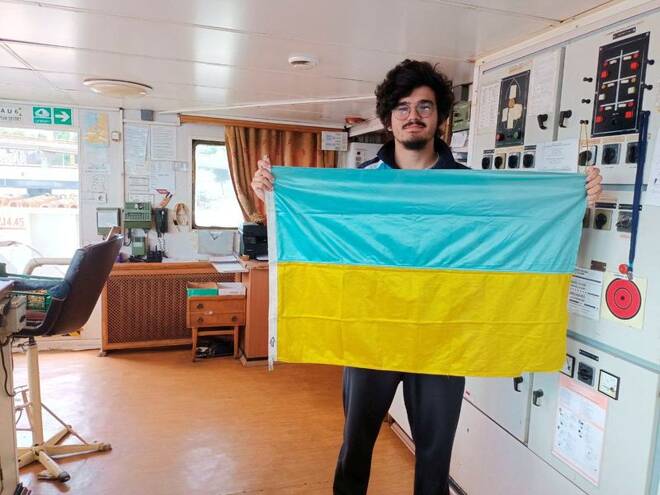Advertisement
Advertisement
Stranded teenage sailor excited at journey home from Ukraine after grain deal
By:
By Ece Toksabay and Ali Kucukgocmen ISTANBUL (Reuters) - Deck cadet Burak Kinayer, 19, is waiting to hear when he will set sail home to Turkey after five months of being stranded by the war in the Ukraine now a grain export deal has been signed.
By Ece Toksabay and Ali Kucukgocmen
ISTANBUL (Reuters) – Deck cadet Burak Kinayer, 19, is waiting to hear when he will set sail home to Turkey after five months of being stranded by the war in the Ukraine now a grain export deal has been signed.
As clashes between Russian and Ukrainian forces echoed off the coast of Odesa last weekend, he became concerned, but Kinayer said his nervousness gave way to excitement as the Kaptan Cevdet gets ready to leave, potentially in the coming days.
“The way back does not scare me,” the trainee navigational deck officer told Reuters via videolink from aboard the ship.
“We can say that our excitement and hopes have been through the roof in the recent days,” he said.
Kinayer’s ship is one of dozens preparing to depart from three Black Sea ports blockaded by Russia after its invasion of Ukraine. The opening came after Moscow, Kyiv, Ankara and the United Nations signed a grain-and-fertiliser export deal meant to ease concerns over a growing global food crisis.
Ukraine’s shipments via sea have stalled since February, stoking global prices for grains, cooking oils, fuel and fertiliser. Moscow has denied responsibility for the food crisis, blaming Western sanctions for slowing exports and Ukraine for mining the approaches to its ports.
A coordination centre will be unveiled on Wednesday in Istanbul to oversee ships departing Ukraine and inspect incoming ships for weapons. It will include U.N., Russian, Ukrainian and Turkish delegations.
A Turkish official said on Wednesday all the details had been worked out, including a safe route for ships that will not require the clearing of sea mines, with the first ship likely to depart from Black Sea ports in a few days.
“There is a slight uneasiness but it is good for us that controls will be made and that other ships will be escorting us. This makes us feel safe,” said Kinayer, when asked how he was anticipating a journey with mine sweepers and military escorts.
He and his crew-mates have lived on the ship for the past five months, required to stay on board by the vessel’s operators, given the potential difficulties of returning should they leave.
Kinayer said they were frightened when Russia launched its invasion in February, with people fleeing the nearby city of Odesa and growing concerns about to how to find food.
The nerves returned on Saturday when another Russian strike hit Odesa’s port. Russian Foreign Minister Sergei Lavrov said the strike had been aimed at military infrastructure.
“We were a bit scared by the attack a couple of days ago thinking, ‘What will happen to the deal?’,” he said.
“Our emotions are complicated. As the final days arrive, we feel both excitement and joy,” Kinayer said.
Although his first experience as a deck cadet, learning how to be an officer in charge of a navigational watch, was overshadowed by war, Kiyaner said his love for sea trumped everything.
“It is bad that my first experience turned out to be this way and it will have a scar on me. But since I build my future with the sea, I don’t think about quitting (this profession) because this happened,” he said.
(Editing by Jonathan Spicer and Alison Williams)
About the Author
Reuterscontributor
Reuters, the news and media division of Thomson Reuters, is the world’s largest international multimedia news provider reaching more than one billion people every day. Reuters provides trusted business, financial, national, and international news to professionals via Thomson Reuters desktops, the world's media organizations, and directly to consumers at Reuters.com and via Reuters TV. Learn more about Thomson Reuters products:
Did you find this article useful?
Latest news and analysis
Advertisement
